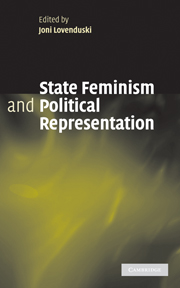Book contents
- Frontmatter
- Contents
- List of figures
- List of tables
- Notes on contributors
- Preface
- List of abbreviations
- 1 Introduction: state feminism and the political representation of women
- 2 Gendering political representation: debates and controversies in Austria
- 3 The Belgian paradox: inclusion and exclusion of gender issues
- 4 A politics for presence: state feminism, women's movements and political representation in Finland
- 5 Gendering the republican system: debates on women's political representation in France
- 6 WPAs and political representation in Germany
- 7 Gendering the debate on political representation in Italy: a difficult challenge
- 8 High tides in a low country: gendering political representation in the Netherlands
- 9 The women's movement, gender equality agencies and central-state debates on political representation in Spain
- 10 Party feminism, state feminism and women's representation in Sweden
- 11 Party government and women's representation debates: the UK
- 12 Women's policy agencies, the women's movement and representation in the USA
- 13 Conclusions: state feminism and political representation
- Appendix 1 Tables of women's representation in eleven countries
- Appendix 2 The RNGS model: summary of variable descriptors
- Index
- References
3 - The Belgian paradox: inclusion and exclusion of gender issues
Published online by Cambridge University Press: 22 September 2009
- Frontmatter
- Contents
- List of figures
- List of tables
- Notes on contributors
- Preface
- List of abbreviations
- 1 Introduction: state feminism and the political representation of women
- 2 Gendering political representation: debates and controversies in Austria
- 3 The Belgian paradox: inclusion and exclusion of gender issues
- 4 A politics for presence: state feminism, women's movements and political representation in Finland
- 5 Gendering the republican system: debates on women's political representation in France
- 6 WPAs and political representation in Germany
- 7 Gendering the debate on political representation in Italy: a difficult challenge
- 8 High tides in a low country: gendering political representation in the Netherlands
- 9 The women's movement, gender equality agencies and central-state debates on political representation in Spain
- 10 Party feminism, state feminism and women's representation in Sweden
- 11 Party government and women's representation debates: the UK
- 12 Women's policy agencies, the women's movement and representation in the USA
- 13 Conclusions: state feminism and political representation
- Appendix 1 Tables of women's representation in eleven countries
- Appendix 2 The RNGS model: summary of variable descriptors
- Index
- References
Summary
Introduction
The Belgian understanding of representation is intimately related to the conception of citizenship, which itself is connected to the specific history of the Belgian state. In 1830 Belgium became a unitary constitutional monarchy, but Belgian society has never been homogeneous. Its political and institutional landscape is characterised by a segmented pluralism, reflecting basic social cleavages. Religious and economic divisions played a predominant role until the 1960s when the cleavage between the Flemish and the Francophone language groups gained priority. Although both the economic and religious cleavages led to descriptive representation, it was above all the increasingly salient linguistic cleavage that led to a redefinition of the institutions of political representation. The federalisation of the Belgian political system, a process that started in the 1960s, led to an institutionalisation of the prevailing interpretation of citizenship (on the Belgian political system see Deschouwer 2002, 2004).
Belgian citizenship is believed to be embedded in its social groups. Like the Netherlands, Belgium is a consociational society that integrates social groups into processes of decision-making. Such recognition supports provision for descriptive representation according to which the membership of public bodies and elected assemblies should mirror the society by containing the salient groups, although not necessarily in proportional terms. Whereas segmentation of political and civil society is decreasing, the balanced representation of key social groups continues to be seen as an essential legitimising feature of the political system (Paye 1997).
- Type
- Chapter
- Information
- State Feminism and Political Representation , pp. 41 - 61Publisher: Cambridge University PressPrint publication year: 2005
References
- 5
- Cited by



